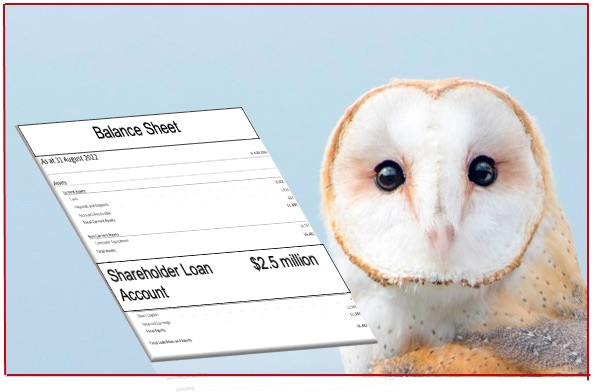
As credit professionals, there is a tendency to look at only the most familiar current assets and liabilities on the balance sheet of a prospective company. If the current or quick ratio turns out to be acceptable, we quickly move on to the next credit request.
But as you know full well, the devil is in the details and putting a close eye on certain accounts can be very telling about a company’s financial condition or other issues. Let me give you a layman’s explanation about what is called Officer or Shareholder Loan Account when the owner or major shareholder is on the receiving end
In general, a shareholder loan represents the balance of funds that the owner or shareholder of the company has either contributed to or has withdrawn from the company. When funds received by the owner are not designated as a dividend, salary, or a gift, the transaction should be recorded as a loan on the company’s books as an asset against the owner.
Now, one of the things we need to understand about this account is the length of time and the amount recorded. For the most part, loans made from the company to the owner are recorded as short-term assets and should be paid back within one year. If the amount is materially small and not paid back within one year, it probably won’t ring any tax or accounting alarm bells, but naturally, it’s always prudent to have these accounts settled before the end of each annual cycle. For good measure, any loan amount should be accompanied by a loan agreement that includes a reasonable interest rate. In other words, even if the company is a small closely held business, doing things correctly and legally is how can avoid IRS audits and other matters that are triggered by red flags.
The problem comes in when the materiality of the loan is (1) a large amount relative to other accounts such as cash, A/R, Inventory, and trade liabilities and (2) it is not being paid back within one year, whether in part or in full. The status of this account can beget some questions:
- Does this represent a financial problem on the part of the owner?
- Is there something happening pertaining to the owner that could undermine the company?
- Is the owner or shareholder trying to avoid paying taxes?
Not too long ago one of my clients received a fairly large credit request to the extent that the existing customer’s financial statement was required to support their credit evaluation. As my client was looking through the financial statement, it showed an officer loan account with a balance of almost $300K against sales $5 million and net profits almost at zero. The cash account was at about $100K and other financial ratios indicated that the company was stressed. In looking at this shareholder account over a two-year period my client noticed the following:
1) The officer loan account was still being classified as a short-term asset even though it was on the books for two years of statements. It’s possible that during the first year it has been paid back and then in the second year it has been taken out again, but this was not known at the time.
2) From year 1 to year 2, the ending account balance in the officer loan account had grown by 50% and was not at $450K with profits in the negative.
Since it appeared that profits were being skimmed off and “loaned” to the owner, my client was concerned that there was a problem here that needed to be clarified.
With all respect for confidentiality, my client asked his potential customer about the status of the officer loan account. In particular, he asked if the account may be paid off during the course of the current year. When no answer was forthcoming, my client decided that perhaps the officer loan account is not being managed according to either accounting and/or tax regulations, or other issues are at hand. Whatever the case may be, the credit request could not be approved.
Because we are inundated with many urgent matters in our daily work, we often can’t or don’t take a moment to get into the details where we could easily overlook something that just doesn’t make sense and could later result is a cash flow and collection issue.
Your questions and comments are most welcome (nseiverd@cmiweb.com).
Nancy Seiverd, President, CMI Credit Mediators, Inc.

